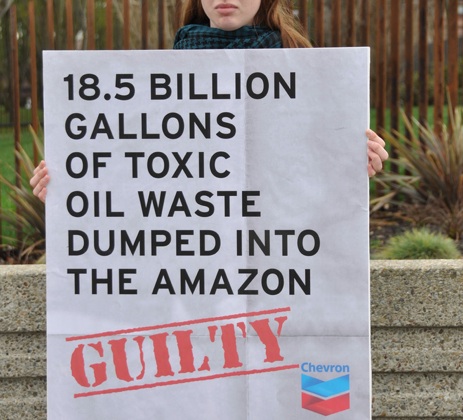Chevron has a lot of money. Which is a good thing, because lawyers are expensive, and Chevron has developed quite an affinity for lawyers. And if you’re a Chevron shareholder who dares speak out, expect to hear from them.
The fossil fuel giant faces an $18 billion fine levied by a court in Ecuador stemming from massive pollution in the Amazon rainforest throughout the 1970s and ’80s. Chevron is understandably loathe to write a check for that amount, given that it constitutes almost nine months’ worth of 2011 profits (or, if you prefer, 25 days worth of revenue). Instead, it would rather unleash an army of esquires who are already on retainer.

Last month, we told you that Chevron filed a complaint against Thomas DiNapoli, the comptroller of the state of New York, because Chevron thinks that plaintiffs’ attorneys gave DiNapoli a campaign contribution to sway his political opinion on the Ecuador judgment. (This is what psychologists call “projection.”)
Powerful political figures aren’t the only object of Chevron’s wrath. In true evil-corporate-behemoth fashion, it has a new target for those attorneys: its own shareholders. From The New York Times:
[I]t might seem odd that last month Chevron subpoenaed one of its investors, Trillium Asset Management, which has sponsored numerous shareholder proposals at Chevron over the years. The oil company demanded documents related to those proposals. The subpoena also asked for records of discussions Trillium had about these proposals with the media.
It is unusual to make such a demand from a shareholder, corporate governance experts say. While companies often try to keep shareholder resolutions off the ballot by contending that they do not follow the rules, going beyond that is rare. …
In an interview last week, Jonas Kron, Trillium’s director of shareholder advocacy and corporate engagement, declined to discuss the subpoena. But it is part of a Racketeer Influenced and Corrupt Organizations lawsuit Chevron has filed against an army of parties involved in bringing an environmental case against the company in Ecuador almost two decades ago.
Kron wasn’t willing to talk to the Times — but earlier today, we spoke with Simon Billenness, an activist and strategist who’d also been subpoenaed and who shared with us a copy of that document.
Billenness, a former Trillium employee who left the organization prior to its work on this case, has been engaged in the campaign to pressure Chevron for a long time. Now with Strategy for Corporate Responsibility and Social Investment, he has been involved in filing shareholder proposals on behalf of Amnesty International, the Unitarian Universalists, and other groups. In 2011, Billenness was lead author on a report (referred to as the “Billenness Report,” below) compiled for Amazon Watch and Rainforest Action Network that showed how Chevron has described its risk in the Ecuador case differently to its shareholders and in sworn legal documents.
Billenness thinks that this is the point on which Chevron is most vulnerable. “Chevron has not spoken to any of the discrepancies and any of the differences between what they say to shareholders in SEC statements and what they’ve said in sworn testimony to the court,” he suggested when we spoke. “I think that’s one of the key questions around this case that Chevron simply does not want to answer — and clearly wants shareholders to shut up about.”
This is how Chevron and its attorneys say to shut up. Last month, Billenness received a 39-page subpoena listing records Chevron seeks, including:
1. All documents concerning any payment, compensation, revenue, or any other thing of value YOU have received, been offered, contracted to receive, or have been promised conceming YOUR involvement in, or work concerning, the CHEVRON LITIGATIONS or SHAREHOLDER ACTIONS.
2. All documents concerning any payment, compensation, revenue, or any other thing of value YOU have given, offered, contracted to give, or have promised concerning the CHEVRON LITIGATIONS or SHAREHOLDER ACTIONS.
3. All documents concerning the BILLENNESS REPORT, including but not limited to drafts and notes concerning the BILLENNESS REPORT. …
6. All documents concerning SHAREHOLDER ACTIONS, including but not limited to CHEVRON shareholder resolutions sponsored by TRILLIUM beginning as of 2005, CHEVRON investor statements sponsored by TRILLIUM beginning as of 2009, and any SHAREHOLDER ACTIONS taken by the AFL-CIO.
7. All communications between YOU and any stock market analysts, investment professionals, energy industry analysts, journalists, or MEDIA professionals or organizations concerning CHEVRON or the CHEVRON LITIGATIONS. …
9. All documents concerning any statements posted, published, or disseminated by YOU on any of the RELATED WEBSITES or other MEDIA outlets concerning the CHEVRON or the CHEVRON LITIGATIONS.
10. All communications between YOU and any of RAN, Sanford Lewis, Graham Erion, Orin Kramer, AMAZON WATCH, AMAZON DEFENSE, FRONT, TRILLIUM, or HINTON COMMUNICATIONS concerning CHEVRON or the CHEVRON LITIGATIONS.
11. All communications between YOU and any U.S. GOVERNMENTAL AGENCY concerning CHEVRON or the CHEVRON LITIGATIONS.
12. All communications between YOU and any of the RICO DEFENDANTS or CO- CONSPIRATORS concerning CHEVRON or the CHEVRON LITIGATIONS.
13. Documents that show the establishment and current legal standing of the organization Strategy for Corporate Responsibility and Social Investment, including but not limited to charters, articles of incorporation, and certificates.
14. A current organizational chart or other documents that show the management and reporting structure of the organization Strategy for Corporate Responsibility and Social Investment.
15. Documents that show YOUR document retention and destruction policies and practices, including those policies and practices currently in effect and any which were in effect between January I,2009, and the date of this request.
Billenness doesn’t believe that Chevron is entitled to the documents; his attorneys (so many attorneys!) made that case to the court last week. But getting the files likely isn’t the goal. “I think this is clearly an attempt by Chevron to intimidate and harass shareholders who’ve been publicly critical of the company, and publicly critical of how management has dealt with this issue,” Billenness said, noting that — at least in theory — the company belongs in part to him and his organizations as shareholders. In his view, the company’s attempt to chill opposition has not been successful; when we spoke, he’d just completed new documents that he planned to file requesting action by the company. “I haven’t had [any shareholder activists] express any pulling back, and, on the contrary, additional shareholders have come into the fray, like Walden Asset Management,” he said.
“If the intent was to intimidate and harass shareholders, it’s clearly backfired,” Billenness believes. “It does not seem to have killed the desire of shareholders to continue to press the company to come clean about the risks to the company and the risks to the shareholders from the company’s continual doubling-down on this failed legal strategy.”
Chevron’s high-priced lawyers aren’t going to be happy about that.



